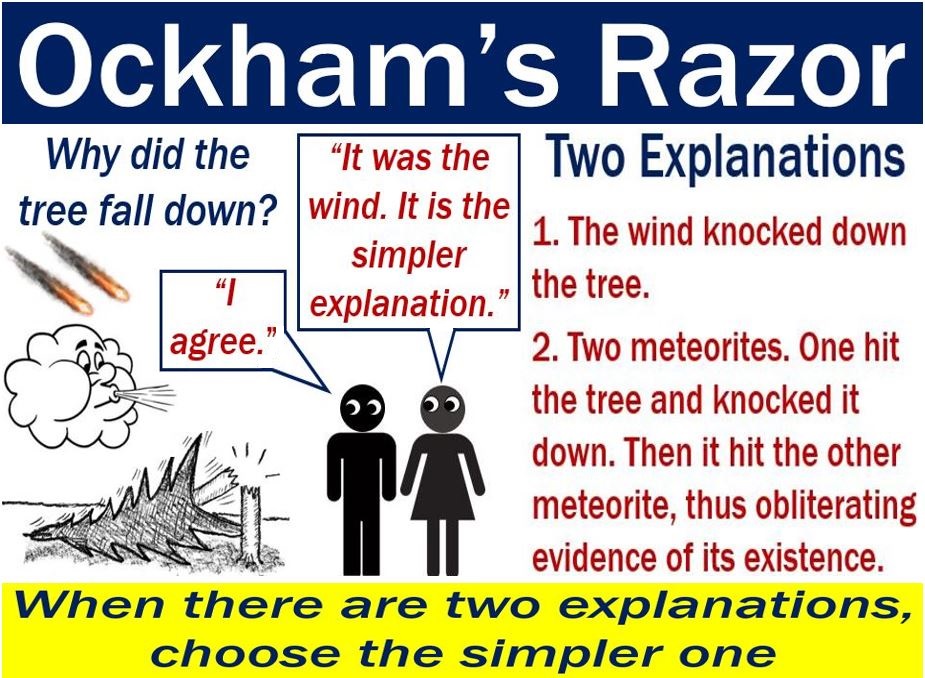Ockham’s razor is an idea that we should reduce assumptions to their minimum. Therefore, if we consider two equally-valid assumptions, we should prefer the simpler one. In other words, among rival hypotheses, we should select the one with the fewest assumptions.
We also use the terms ‘principle of parsimony,’ ‘principle of simplicity,’ and ‘principle of ontological economy’ with the same meaning.
The following spellings are also possible: ‘Occham’s razor’ or ‘Occam’s razor.’
We attribute the term to William of Ockham (1287-1347), an English Franciscan friar, scholastic philosopher, and theologian. Ockham was one of the major figures of medieval thought. He was at the center of major political and intellectual controversies of the fourteenth century. The Church of England remembers him with a commemoration on April 10th.
Regarding what became known as Ockham’s razor, Ockham wrote: “Entities are not to be multiplied beyond necessity.” In simple English, his phrase means “We should not use more things than are necessary.”
An entity is a person, government, company, etc. In business, it is anything that we form and administer.

Ockham’s razor – example
For example, let’s suppose there are many possible ways that something might have occurred. The way that uses the fewest assumptions is most likely to be the right one.
However, Ockam’s proposal only works if the complex and simple explanations both work equally well.
Therefore, if the complex explanation appears to do a better job than the simple one, we must use the complex one.
Scientists use Ockham’s razor as a heuristic guide when developing theoretical models. In science, Ockham’s proposition is not an irrefutable principle of logic or a compelling scientific result.
The preference for simplicity reduces the risk of confusion or making false assumptions.
Ockham’s razor is a principle. It gets rid of unnecessary explanations in the same way a razor gets rid of excess hair.
Simplest assumptions and probability
Let’s imagine that the night had been windy. The next morning we saw a tree that had fallen down. There are two possible explanations:
– Two meteorites had come down during the night. One hit the tree and knocked it down. Then the two meteorites hit each other and obliterated any trace of themselves.
– The wind blew down the tree.
The two explanations are possible. However, many other improbable things would also need to have occurred for the meteorite to have been the culprit. The meteorites would need to have hit each other and then left no trace of themselves.
Additionally, meteorites are much less common than the wind. Since the meteorite explanation needs many assumptions for it to be true, it is not likely to be the right answer.
According to Ockham’s razor, the wind blew down the trees. We prefer this explanation because it is the simplest answer, and thus probably the right one.
Ockham’s razor in medicine
Doctors use Ockham’s proposition all the time because medical schools train them that way.
When there are several explanations for a patient’s symptoms, the doctor usually chooses the simplest diagnosis.
For example, a baby girl probably has diarrhea because of something she ate rather than a rare birth defect.
Professors often say the following to their medical students:
“When you hear hoofbeats, think horses, not zebras.”
However, many specialist doctors try to encourage medical professionals to ‘think zebras.’ We need to think ‘zebras,’ they argue because it is taking too long to diagnose rare diseases.
